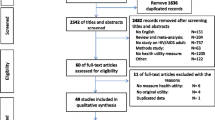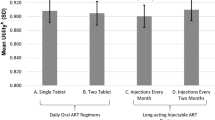Abstract
Background
Utility assessment involves assigning values to experienced or unfamiliar health states. Pivotal to utility assessment, then, is how one conceptualizes health states such as “current health” and “perfect health.” The purpose of this study was to ascertain how patients with HIV think about and value health and health states.
Methods
We conducted open-ended in-depth interviews with 32 patients with HIV infection purposefully sarmpled from a multicenter study of quality of life in HIV. After undergoing computer-assisted utility assessment using the rating scale, time tradeoff, and standard gamble methods, patients were asked how they thought about the utility tasks and about the terms “current health” and “perfect health”.
Results
Patients understood the health valuation tasks but conceptualized health states in different ways. Many patients believed that “perfect health” was a mythical health state, and some questioned whether it was even desirable. “Current health” was variably interpreted as the status quo; deteriorating over time; or potentially improving with the hope of a cure.
Conclusion
Patients with HIV infection vary in the way they conceptualize health states central to utility assessment, such as perfect health and current health. Better understanding of these issues could make important methodologic and policy-level contributions.
Similar content being viewed by others
References
Torrance GW. Measurement of health state utilities for economic appraisal. J Health Econ. 1986;5:1–30.
King JT, Styn MA, Tsevat J, Roberts MS. “Perfect health” versus “disease free”: the impact of anchor point choice on the measurement of preferences and the calculation of disease-specific disutilities. Med Decis Making. 2003;23:212–25.
Ubel PA, Jankovic A, Smith D, Langa KM, Fagerlin A. What is perfect health to an 85-year-old? Evidence for scale recalibration in subjective health ratings, Med Care. 2005;43:1054–7.
Tsevat J, Sherman SN, Sanchez-McElwee JA, Mandell KL, Sonnenberg FA, Fowler FJ. Understanding health values of HIV-infected patients: results from focus groups (abstract). J Gen Intern Med. 1997;12(suppl 1):64.
Mrus JM, Sherman KE, Leonard AC, Sherman SN, Mandell KL, Tsevat J. Health values of patients coinfected with HIV/hepatitis C: are two viruses worse than one? Med Care. 2006;44:158–66.
Mrus JM, Yi MS, Leonard AC et al. Multi-center study of utilities in patients with HIV/AIDS in the era of highly-active antiretroviral therapy (HAART) (abstract). Med Decis Making. 2003;23:568.
Patton MQ. Qualitative Evaluation and Research, 3rd edition, Thousand Oaks, CA: Sage Publications; 2002.
Willis GB. Cognitive Interviewing. Thousand Oaks, CA: Sage Publications; 2005.
Centers for Disease Control and Prevention. A glance at the HIV/AIDS epidemic. Available at: http://www.cdc.gov/hiv/PUBS/FACTS/ATA-GLANCE.htm. Accessed January 3, 2006.
Mrus JM, Leonard AC, Yi MS et al. Health-related quality of life in veterans and non-veterans with HIV/AIDS. J Gen Intern Med. 2006;21:S39–47.
Szaflarski M, Ritchey PN, Leonard AC, et al. Modeling the effects of spirituality/religion on patients’ perceptions of living with HIV/AIDS. J Gen Intern Med. 2006;21:S28–38.
Radley A. Making Sense of Illness. Thousand Oaks, CA: Sage Publications, 1994.
Krause NB, Jay GM. What do global self-rated health items measure? Med Care. 1994;32:930–42.
Author information
Authors and Affiliations
Corresponding author
Additional information
None of the authors have any conflicts of interest to deciare.
Rights and permissions
About this article
Cite this article
Sherman, S.N., Mrus, J.M., Yi, M.S. et al. How do patients with HIV/AIDS understand and respond to health value questions?. J GEN INTERN MED 21 (Suppl 5), S56–S61 (2006). https://doi.org/10.1111/j.1525-1497.2006.00647.x
Issue Date:
DOI: https://doi.org/10.1111/j.1525-1497.2006.00647.x




